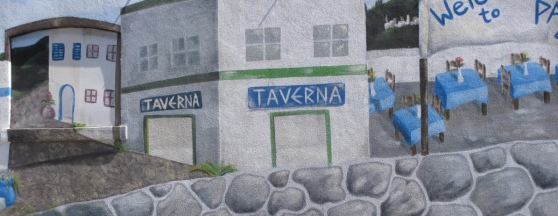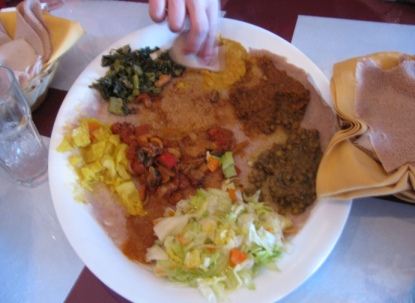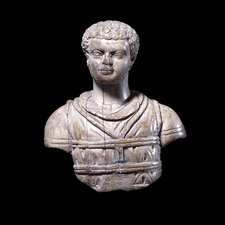
Papa Cristo’s in Los Angeles is where Greece intersects with Eritrea and Ethiopia (Photo property of MamaAfrika.com)
I was in Los Angeles a couple of weeks ago and while there, visited one of my favorite little places to shop. Since you probably already know that I’m a real food lover (I still feel odd saying “foodie”), of course it’s related to where I can buy what I love most: cooking ingredients!
Since I happened to be in LA on some other business; I took the occasion to make my way down to Papa Cristos Greek restaurant. So, why on earth, you are certainly asking yourself, would I find myself so excited to go to a Greek place? Well, because I do love Greek wines, baklava and Eritrean food. Yes, I said it: Eritrea is (almost) in Greece.
Now, to try to turn that into something that makes sense: in LA, as in most large cities, there are ethnic neighborhoods. Ethnic neighborhoods tend to blend, as opposed to having a clear line. I’m sure that if I were to return to my childhood memory of New York’s Chinatown and Little Italy with a clearer view; I’d have realized that they too blended. But, that is a story for another time…
So, let’s return to LA: There is a section of Los Angeles called “Little Ethiopia”. It is home to many Eritreans and the largest population of Ethiopians in the United States. It is a great stop if you want to have a taste of Ethiopian or Eritrean cuisine. I highly recommend the Nyala Restaurant on Pico if you decide to pop into the area. They are famous for their lunch buffet.
But back to how Greece meets Eritrea… You see, the first time I realized that the connection isn’t automatic for a lot of people is when I first took a friend with me to Papa Cristo’s to pick up some injera (a soft sourdough “pancake” of sorts that is used to eat most Ethiopian and Eritrean dishes with). She looked at me completely perplexed when we entered the place and asked the obvious question: “WHY on earth would this Greek guy sell African foods?” I then had to explain to her that we were related in many ways. Eritrea used to be a part of the Greek sphere of influence, we have traded for centuries and our foods reflect that, (as I’m sure would our DNA, if anyone bothered to check). Eritrea’s name comes from the Greek name for the Red Sea coastline “Erythra Thalassa”.
Queen Cleopatra of Egypt was from the Ptolemy family of Greece, not a woman of African or Arab descent, as many tend to imagine her. And, since the Nile River flows north to Egypt, much trade was done in both directions. Thus, ancient Greek archeological sites can be found in both Eritrea and Ethiopia. This river has connected the peoples of the Mediterranean Sea to those in the Horn of Africa for ages. After all, where there is water, there is commerce. And, where there is commerce, there is an exchange of ideas, cultures and faiths.
Let’s compare cultures for a moment: Greece: Greek Orthodox Church, Eritrea: Coptic (Orthodox) Church. Greek food has a particular flavor profile which uses: fenugreek, oregano, ginger, cumin, turmeric… Then you come to Eritrean food where you meet those same flavors again. It’s all about the way in which they are blended and in what proportions. Lamb? Yes, we both eat it. At the end of the day, the climates are the same and so are many aspects of the cultures. Where food is concerned, Eritreans have much more in common with Greeks than we do with Senegalese or Namibians. And Greeks have more in common with an Ethiopian Copt where faith is concerned than they do with fellow Europeans in Norway or even Catholics in Ireland.
So, for me to walk into Papa Cristo’s store, it makes complete sense that he’d have incense burners, tiny coffee cups for our coffee ceremony, containers stacked high of spices we use for cooking and yes, even injera made by a local Ethiopian lady who runs a business from home. Greece and Eritrea have always felt like cousins to me. We might speak a different language and look a little different; but even that isn’t always the case. But for my friend, as well as many others that I’ve had conversations with in the past… it is a healthy reminder that European influence in Africa didn’t start with colonization. We’ve been trading together, praying together and eating together for eons before that nasty turn of events. And, I have faith that with good will and a clear understanding of history, which is then put in its proper context… we’ll be working together to create a mutually beneficial experience for a long time to come. Not because of politicians or debates in the United Nations. But because of good hearted people who reach out to each other with sincere interest and good will.
Papa Cristo is a man who is short in stature, but big in heart and personality! His father founded the store over 60 years ago with the idea of bringing a little of his homeland to Southern California. Considering his proximity to the Little Ethiopia neighborhood, they slowly added Eritrean and Ethiopian products to their list of wares. It was a brilliant move considering there is so much cross-over of flavors. If you think of Greek cuisine, you think of a few different spices and herbs off of the bat: Cumin, turmeric, fenugreek… all of which are also used in Ethiopian and Eritrean cuisine.
Greece is tied to both of my cultures, Italian and Eritrean with a pretty tight knot. Thus, it isn’t surprising that I feel at home among the olive oil jars, baklava and loud voices greeting one another as people come through the door. It is so typically Mediterranean and despite Eritrea lying on the Red Sea, it is a nation with a large Mediterranean influence and feel, due to decades of influence from Greece and Italy.
It’s amazing how many people think of Africa as a dark continent first discovered by colonists in the late 1800’s. When, in fact, we have had a rich common heritage for centuries before that. We’ve shared queens, spices and art for ages. We’ve been sending our vessels over the seas to trade, we’ve intermarried and yes there were even African rulers of the Roman Empire.
Africa and Europe, especially southern Europe have a common history that dates way before the Portuguese mimicked and greatly expanded the Arab method of slave trade. And I suspect that our futures are tied as well. So, the next time you hear people oversimplify the relationship between the evil white Europeans and the poor African victims… remember me sitting among the Greeks and buying freshly made injera, remember Cleopatra of Egypt- by way of Greece, remember the Roman emperors and generals who were of African heritage.
My mantra here on the blog is “Dialog matters”. Well, honest, open dialog about our cultures and history is a part of what matters most. Often, we find that as often as it opens the door to discussions about our past and current wounds… it also reminds us of our commonality. So, let’s use this space as a place to keep the dialog going! I anxiously await your comments.
Love,
Mama


Love this article. I remember going to this store with you once several years ago. I felt the cohesiveness then that you have so brilliantly presented in your writing. That part of Los Angeles is very inviting to me and in great part because of the richness of the cultures imbedded there. Great work, as usual, Mama.
Thanks for your kind words Kathleen. Your support means so much. 🙂
I am Eritrean girl, why do you use the name “Mama Africa”, the name is so sad…… I liked your article though. I really don’t think Eritreans normally care that much about this stuff, although we do know the greek influence on our culture and they seem to know us as well….but in current situation where young Eritreans are going through some strage ordeals, it may be okay to say out aloud. By the way, as an Eritrean I feel Eritrean, I don’t feel African. What does it mean anyway??…. It’s a huge continent with diverse culture. Most of the cultures I don’t connect to, eventhough I would want to. I am not an african, or black. I am Eritrean, period. You don’t call Indians or Sri Lankans or other with our kind of color that are outside Africa, black. You name the nation they come from. I am Eritrean, I am semtic, and I am everything that is Eritrea and even more that is outside Eritrea. I am person with my own talents, and abilities. I have soul with it’s own unique qualities, that happens to chose to be Eritrean for a very good reason. But mama Africa, why? IT’s pathetic…. I mean that with love:)
Dear Milena,
Your comment was fair and well-stated. Let me give you my viewpoint and reason I use Mama Africa instead of being more specific: 11 years ago, I had a vision to work with African women to help them feed their families while sharing with the world some of the rich art history we have. I have been blessed to work with women in North Africa in places like Tunisia, in West Africa in countries like Mali and Ghana, in South Africa and Lesotho and of course in Eritrea and Rwanda. This is just a sampling of nations, as we now work in about a dozen countries.
I love Eritrea, no doubt about it. Removing politics from the picture completely, I love Eritrea and her people. I too am proud of my nation’s history and culture. As a child, I had no idea what people in Ghana ate, what languages they spoke in Uganda or very much about the cultures that share the larger piece of land we call Africa.
But, I will share with you that just as Europeans are either German or Italian, Swedish or Swiss; they too have similarities in culture. After all, people move and when they do, they take their cultures with them and there is always an exchange of ideas.
University might have taught me a lot about Africa; but interacting with her people have taught me so much more. I see myself in the face of a woman in Mali as she puts incense on hot coals from the fire. I now know how languages in Niger are related to Tingrinya in ways I never would have imagined. I have learned, thanks to so many wonderful men and women across our continent that we do have certain commonalities, much the way many Asian or South American cultures have a certain similarity in their arts, food and way of seeing the world.
But, more than all of that, I would like to tell you a saying that I repeat often, even in my daily life: “Mama to one, mama to all.” I think that being Mama Africa is ultimately about loving a continent and her diversity. But above all, it is about loving her people. One of the things I love most about Africa IS her diversity. If given the chance to change my nation of birth, I’d keep things as they were. I am grateful to be Eritrean, despite all of our problems today. But, I can say that with the clear understanding that if I had been born in Ghana, I’d probably feel the same. After all, we don’t choose where we take our first breaths.
20 years ago, I too, would have said “I am Eritrean, not African.” Today, I think of things like this: I am human. I am African. I am Eritrean. I am me.
Thank you so very much for your comments! I absolutely love dialog and I particularly love hearing the voices of my sisters, wherever they call home.
Love,
Mama (Eritrea) Africa 😉
I disagree that German and Swedish and Italian peoples have similarities in cultures. Surely, germans and swedish, but Not Italians. Ask them what they think about the Scandinavian and german culture? I speak Italian, and I have heard so many stories – and they always make me laugh(!) Although, yes – they are within the western civilization and there is contact, developement and trade that opens up communications etc. Incense is normal in most muslim countries. What I am more curious about is the tigrigna niger connection – tell me about it? What did you find out?
I am not racist at all, in fact – I respect everyone as the are. At the same time, I need to protect who I am. I don’t want anyone to wash it out, because I am sanely proud and in love of my heritage. The point that everytime my grandmother (who is a very spritual and highly intelligent woman) sees anything about Africans in TV in Eritrea, she has her reactions of how fascinating they are. She just feel aliane in comparison. Contrary to pictures from Africa, when she sees things from India or Sri Lanka or some of those countries, she does see A LOT of similarities. As they do see a lot of similarities with our culture. I have met many Indians who feels that way, and I have an aunt who is a hindu (she followed some gurus there since the 80s and travels there every year) who feels at home in India. She finds many similarities. But that doesn’t makes us Eritreans hindus does it? I also find similarities to north africa, maghreb and mali ,and of course we share so much with Egypt (in fact that’s where our ancestors come from, the bejas) and Sudan and Northern Ethiopia and Djoubti. And we must have something in common with the Somalis, although it is not so easy for Eritreans to have a connection with them, The Somalis are unique people! I also have an aunt who used to work in Nazret in Ethiopia, she worked as a pharmacist – and she was very fascinated by the people south of north ethiopia, of how she different she as Eritrean felt compared to them, in mentality etc. And my mom who lives in Norway have known many Africans when she was a refugee, it was easier for her to befriend Iranians (specially), Indians, Turikish, and Sri Lankan people. Because she found it difficult to connect as deep friendship, like beyond the super ficial. And my mom is not a racist. I don’t think Eritreans are racist people in general.
But I am curious about the Niger and tigrigna connection? Are you born in the US or in Eritrea?
I respect your perceptions of the use of mama Africa. I mean, if you have a heart for that it should be valid, right? That’s the most important think.
I hope you got my reply:), don’t see it here..
Yeah, I can see it now….it is posted:). Pardon my spelling, I have dyslexia and it gets worse when I write English. The last thing I forgot to comment is that yes, we do (our soul) choses our parents and our countries. My grandma shouldn’t hear this, but yes – our soul does it for us. I am sure in America, specially California with so many new agey people this is not very foreign for you. I know this to be true, since I as a 3 years old girl, I had already forseen some of the events that would happen to Eritrea, that vision and knowing I got had a connection with me. I am not a pshychic, but i got clear insight and vision and intuition of some events that would happen later in my life, and most of them happened, in some sense it had a connection with destiney – and that had to do something with chosing my parents and my place of birth which is ER. I am nearly 30 years old woman now. We have plenty of free will, we do. But at the end of the day, we really can’t escape who we are, and that ultimately is our destiney. And my aunt, who dropped being coptic to hinduism – she was told by her guru that she shouldn’t move back to Eritrea when Eritrea became indpendent, because he told her “in 10 years, it will be really horrible!” And didn’t it really become horrible?:) I think Eritrea have a bright future though, I really do – and I can’t imagine it otherwise. God must have some justice.
Woow u guys kinda really twisted the subject around huh all love deki adey maerutey